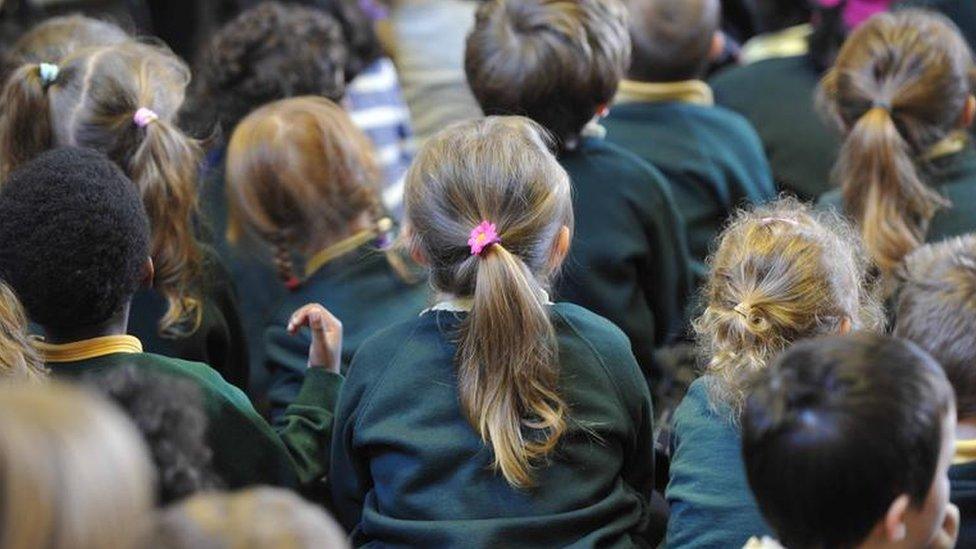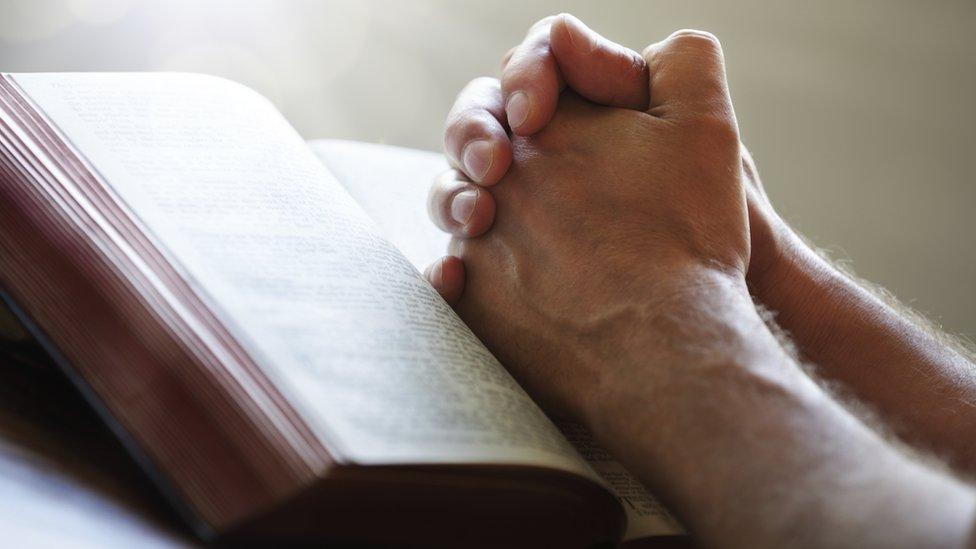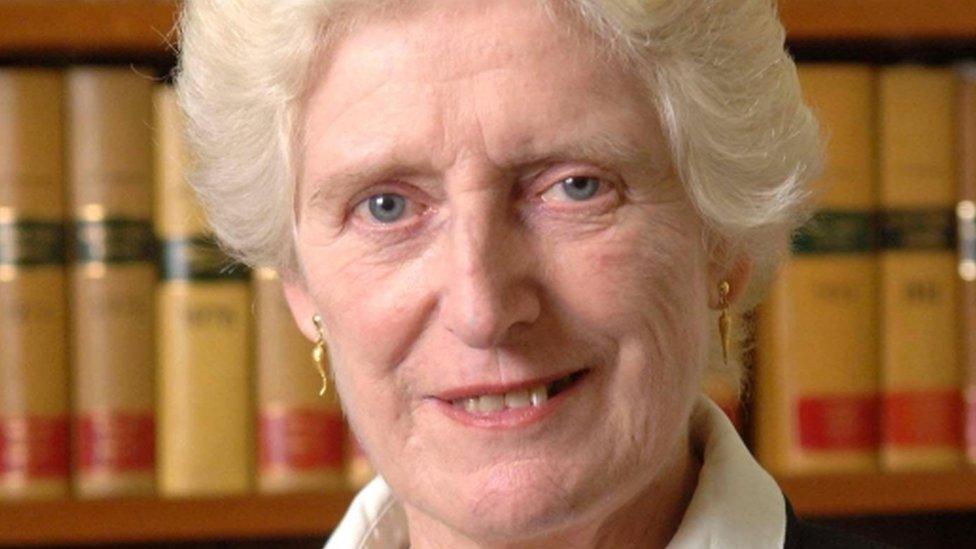Does daily worship count for anything?
- Published

Every day at Christ Church Primary School - a Church of England school on Brick Lane in London - pupils sit together for daily worship, led by the headteacher, Julian Morant.
The pupils come from varying backgrounds, and many different ethnicities, but as he reads from a Bible story, they sit quietly, listening raptly.
He is a strong defender of the tradition, and feels it is a time for the children to pause, to worship, and to give thanks.
"We always have a Bible story, and that comes through in a very sincere way, also within the context of the multicultural community which we serve," says Mr Morant.
"Within our collective worship, we give children time to think - but it's also an opportunity to come together to celebrate and remember that we are a Christian school with a very strong ethos."
In non-faith schools, collective daily worship must be "wholly or mainly of a broadly Christian character", while at faith schools, the worship must be in accordance with the religion or religious denomination of the school.
Yet the legal requirement in England and Wales for daily worship appears to be honoured more in the breach than in the observance at non-faith schools.
Many schools no longer do, and several organisations this year have called for the necessity to be scrapped, even though parents who object to their child taking part in such worship have the right to remove the child.

Rules on collective worship
In every school in England and Wales, there should be an act of collective worship in which each pupil can participate every day
Pupils have to attend, unless their parents withdraw them or unless they are sixth-formers. Withdrawal must be formal, it is not acceptable simply not to turn up
Until 1988 the law expected collective worship to take place in an assembly of the whole school at the beginning of every day. Now it can take place in any group at any time of day
The wording of the law is that it is to be "wholly or mainly of a broadly Christian character"
Independent schools are not covered by Education Acts, but will usually be governed in this context by their foundation deeds, or by policies agreed by their boards of governors. In April 2010 the government released non-statutory guidance for independent schools on improving the spiritual, moral, social and cultural development of their pupils

In 2011, a ComRes opinion poll, external for BBC local radio faith programmes found that just 28% of children in England took part in a daily act of collective worship at their school, and that 60% of the adults questioned thought that the collective worship laws should not be enforced.
In 2004, Ofsted even stopped asking its school inspectors to enforce the necessity for collective worship, as 76% of secondary schools were non-compliant with the law - either by not having worship every day or not having worship at all.
Since then, calls for the law to be scrapped have gathered momentum.
Review call
In November this year, a study funded by the Arts and Humanities Research Council, external, undertaken by a group of academics from across the UK, called for a wide-ranging government review into what requirements should be made of schools around providing assemblies.

Currently worship must be a of a mainly Christian nature
It suggested investigating the rationale behind schools being required to provide daily religious worship, and its authors called on the review to consider what explicit needs of society, schools and pupils should be met through any future requirements.
The study itself found the current arrangements to be "incoherent and to infringe upon pupils' freedom of religion or belief".
That call followed a separate report in June by the Lancaster University sociology of religion expert, Prof Linda Woodhead, and a former Secretary of State for Education, Charles Clarke.
Their report, A New Settlement: Religion and Belief in Schools, external, noted that the educational landscape had changed enormously over the past few decades, and concluded that the requirement for daily compulsory worship in English schools should be abolished, and replaced with non-statutory guidance on the provision of assemblies.
Both the British Humanist Association (BHA) and the National Secular Society (NSS) are also in favour of scrapping the current requirement, with the BHA calling it "unworkable, hypocritical, counter-productive and divisive", external.
The NSS terms it, external "an anachronism; the legacy of a society unrecognisable from the diverse and pluralistic Britain of today where citizens hold a wide variety of religious beliefs, and increasingly, no religious beliefs".
Negative culture
The chair of the Accord Coalition for Inclusive Education, external, Rabbi Dr Jonathan Romain, agrees. He says the current legal arrangements do not work.
"Not only do they fail to properly respect staff, parents and pupils' autonomy and rights but, because many find the current rules unworkable, a culture has been created where a great many schools rarely provide assemblies, if at all," he believes.
"If we are to rescue the opportunity for pupils to communally explore and forge shared values, in a way that is workable and respectful, then the government must show leadership and repeal the collective worship laws as a matter of urgency.
"The current laws are repressive and utterly self-defeating. Assemblies can have a positive role as a time of shared values and communal togetherness but should not be a divisive imposition of religious worship."

Baroness Elizabeth Butler-Sloss called for a radical overhaul
That clamour for change was underlined by recommendations by the most recent report to address daily worship in schools, which concluded that they should no longer face a legal requirement to provide such worship of a Christian character in a Britain that is increasingly multicultural.
Earlier this month, the Commission on Religion and Belief in British Public Life, external, which was led by the former High Court judge Elizabeth Butler-Sloss, called for a radical overhaul of the teaching of belief to make it more realistic and relevant in a diverse and increasingly secular country.
It also suggested the repeal of mandatory daily acts of collective worship that are wholly or mainly of a Christian character, saying that the arguments in favour of retaining compulsory Christian worship in UK schools were no longer convincing, and that schools should instead have a more inclusive "time for reflection", which would embrace children of all and no faiths, aimed at contributing to their "spiritual, moral, social and cultural development".
The Church of England and the Roman Catholic Church in England and Wales continue to support the mandatory daily act of worship.
Rev Nigel Genders, Church of England chief education officer, said: "There is plenty of flexibility in the provision to enable all pupils to benefit without compromising their faith or lack of it.
"Where there are real objections it is a parent's right to withdraw their child from worship, and the very few who take up that right demonstrates that schools have found exciting and creative ways of using collective worship to further children's spiritual and moral development. There is no expectation of commitment and the exposure to the range of religious traditions encourages community cohesion."
There are individual members of the clergy who believe that reform is overdue, and who suggest that time for some kind of moral and philosophical reflection might be preferable.
Although few are likely to be putting their heads above the parapet to suggest that around Christmas time.
- Published13 November 2015
